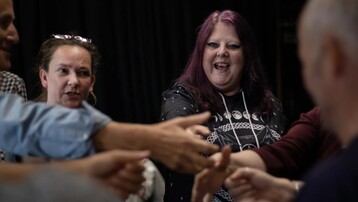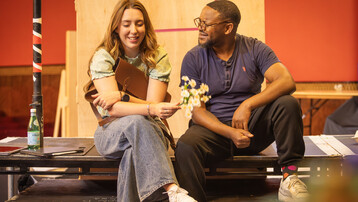News Story
I’ve loved Poulenc’s music since my student days, when Graham Johnson and I performed “La courte paille” in a recital at the Royal Academy of Music. We went to Paris to work with Pierre Bernac on “Tel Jour, telle nuit” which was a wonderful experience, almost as good as studying the songs with Poulenc himself. The recording they made together tells you almost all you need to know about how to perform the cycle; Bernac finds such an array of colours in his voice and every word is crystal clear. I think the last song, “Nous avons fait la nuit” is one of the great songs in all the repertoire, in its expression of love, wonder and quiet contentment: the piano postlude always moved me to tears.
I have written a few thoughts on singing ‘La Voix Humaine’ in a book I wrote with Olivier Bellamy ’Il nous faut de l’amour’- but it’s in French! So…
I first sang “La Voix Humaine” with Glyndebourne Touring Company in 1977 in a doublebill with “The cunning little vixen”! It was SO hard to learn because it’s non-stop, 45 minutes on the end of the phone and no-one to give you a cue- there have been stories of singers having a prompter on the other end of the phone but I don’t know if that’s true! Each time the call is cut off and Elle answers the ring again, ‘allo, allo’ is at a different pitch and leads off in a different direction: if you go the wrong way you can cut pages of script! There are comparatively few lyrical passages when you can really sing and enjoy Poulenc’s beautiful writing for the voice, so when they come they are precious. As it’s a conversation, the work is broken by silences while the lover speaks and the singer and accompanist, or conductor, have to work out what is being said so that the pauses are the right duration: too short and you don’t have time to react and change, too long and you can’t sustain the emotion and the whole piece sags. The first conductor I worked with on the piece said he spent more time on it than on preparing a Wagner opera.
La Voix Humaine is all about lying, about not seeing the other person and not knowing the reality of the situation. ‘Elle’ is lying when she says she is well and happy, that she’s wearing her pink dress, that she’s just back from shopping with Marthe etc, and he is lying by saying he’s at home. She catches him out, literally, but doesn’t say so; she admits her lie and tells him that she would understand if he had told her he was at home alone so as not to hurt her any more. The accompaniment here is like a slowly turning screw, boring into her. She hopes that he will ‘own up’ so that this relationship of 5 years doesn’t end in a lie, but he won’t do it. And then he tells her that he and his new wife will be going to Marseilles, where Elle had spent so many happy times with him. I think that finally breaks something inside her and she begs him to hang up. It’s a devastating piece to perform because you just have to live through it every time.
I have performed it a lot since the Glyndebourne Tour, mainly semistaged as part of an orchestral concert, but with chaise-longue, table, rug, and telephone ( telephone supplied by myself!) Two performances stand out in my memory: in Madrid it was staged as a double-bill with the play, and ‘Elle’ was played by one of Almodovar’s favourite actresses, Cecilia Roth. She performed the play in Spanish and while the orchestra filed into the pit a recording of the slow movement of Poulenc’s flute sonata was played and we went straight into Poulenc’s operatic version. ( The director wisely said that if they had an interval, all Cecilia’s fans would go home…) It was a very beautiful production and Almodovar came to see it; we were invited to watch him filming in the middle of the night in a Madrid suburb. He was filming ‘Volver’ and we all had pizza at about 2am with Penelope Cruz in her winnebago.
The other occasion was at the Proms with Sir Andrew Davis on the hottest August night ever recorded ( at that time, anyway) We had a small stage area in front of the orchestra and very powerful lighting which contributed to the overheating. I was wearing a burgundycoloured silk dress which after 45 minutes was rather damp. Andrew gave me a huge hug and conducted the rest of his concert in a pink tuxedo.
My Poulenc credentials are good: Graham and I were given permission by Poulenc’s heirs to record the version with piano on DVD; before that they had only allowed performances with orchestra; we made a film at Poulenc’s house in Noizay- I slept in his room- and I am very proud to be the President of Les Amis de Francis Poulenc in France! I just wish that I had known him…


